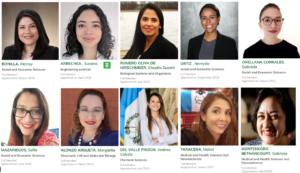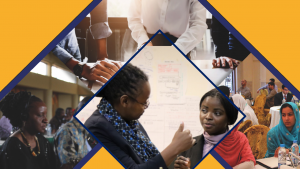In their own words: CSTC Trainers Discuss VakaYiko’s EIPM Course
Ebenezer Rexford Amankwah and Anna Ofori are trainers from the Ghana Civil Service Training Centre who participated in delivering VakaYiko’s Evidence-Informed Policy Making Course. Ebenezer also acted as the coordinator between CSTC and the VakaYiko programme, working closely with GINKS. Nana Gyamfi is a Senior Accountant at CSTC and is also involved in traditional leadership as a chief of his community. He participated in the course first as a participant and has since become a trainer.

Ebenezer Rexford Amankwah and Anna Ofori are trainers from the Ghana Civil Service Training Centre who participated in delivering VakaYiko’s Evidence-Informed Policy Making Course.
Ebenezer and Anna, as trainers how do you find the final version of the EIPM Course?
Ebenezer: It’s very informative, very educational. I see it as an eye-opening material… it’s very current. As a trainer and coordinator, I noticed
VakaYiko’s ability to modify the course material as and when it is required. The reports of the participants were strictly adhered to. For instance, we had a site visit this time, unlike before when there was no site visit in the programme—we incorporated that in 2016.
I also want to commend the project because the case studies we have are usually centred on Ghana and the civil service. But your case studies are more West African, or Africa…and the world at large. It throws more light, that we are living in a global village, what concerns someone else concerns you.
Anna: The Boolean operators, that’s the session I love so much, covering the things you should do to get information…it was very interesting and we use it a lot. It helped us a lot as trainers.
The session I train on is Designing Effective Messages (in Module 4). You have a whole lot of information you want to give to your audience, but there is a need for you to focus on one particular thing.
What challenges is the EIPM course helping civil servants solve in their workplace?
Ebenezer: First of all, the searches. It has taken off a lot of our time as we used to take a lot of time in trying to search for a simple document. We have also been exposed to various search engines, so you can assess credible data. We can also look at the type of data that we go out for, whether they are credible enough or not credible enough, all the factors you need to go through to decide—we have learnt this from EIPM.
Anna: I always tell participants that coming up with decisions in the office to solve a particular problem, that’s a type of policymaking. So [the course helps them] see themselves in the policy process.
Nana: The networking was very lively, there were a lot of people from different ministries, departments and agencies.
I’m a chief and I initiate policy in my rural area under customary law. When I was taught how to assess evidence, I was highly interested. It’s going to help me in coming up with policies in my area. When you want to make policy on community development, you need to find out people’s interest in the issue. Before you come out with a policy you need to do a proper assessment on the ground, find out from the people. You don’t sit somewhere and take your own decisions. You need to do a lot of consultations, you need to find out whether what you are doing is applicable or not.
What are the most significant changes you have seen as a result of the VakaYiko programme?
Ebenezer: I see that participants that pass through are more confident when they are reporting to their superiors because they are armed with the necessary tools to really convince the authorities.
Anna: One participant told me that they felt the course was very good, but they were surprised most of their colleagues haven’t had the opportunity to be part of it because it teaches them about a lot of things, skills, designing effective messages, research design, how to assess evidence.
Ebenezer: The interest has just been aroused, a lot of people are sending applications because their friends are informing them about how the course has helped them. There is a lot of demand.
What’s next for the EIPM course at CSTC?
Nana: I was very interested in what we were taught so I decided to become a trainer. There is going to be an advanced ToT, I think after that I will be well equipped after that.
Ebenezer: The Office of the Head of Civil Service gave us a final mandate that the course is really good. Portions of it have been taken and it is in the scheme of service training, aside from it standing on its own. [for example] the section on search engines, it’s already in some of the courses we do here— it is labelled Computer Literacy and Internet Searches. We have Public Policy Management, portions of it are in there. At the moment we are running these courses, it is ongoing.

 Next Post
Next Post


